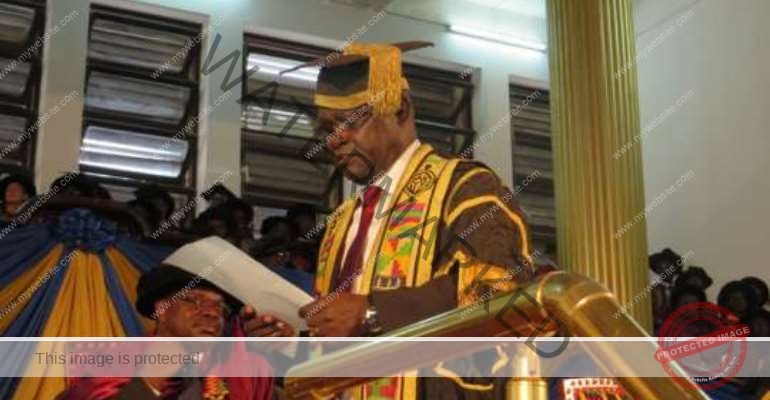The Koforidua Technical University (KTU) has held an investiture ceremony to induct into office its second substantive Vice-Chancellor (VC), Professo
The Koforidua Technical University (KTU) has held an investiture ceremony to induct into office its second substantive Vice-Chancellor (VC), Professor John Owusu, for a four year-term.
Also inducted into office are Professor Richard Ohene Asiedu, Pro-Vice-Chancellor, Evelyn Fafa Adom, Registrar and Rev. Prince Baffour-Ofori, Director of Finance. Prof. Owusu, who until his appointment was a lecturer at the Hospitality Department of the university, later rose to become the second VC since the former Koforidua Polytechnic was converted into a university by the government in 2016.
He took over from Professor David Kofi Essumang, the first Vice-Chancellor of the university.
Dignitaries
Present at the ceremony were the Deputy Director-General of Ghana Tertiary Education Commission (GTEC), Professor Yayra Dzakadzie, the Council Chairman of KTU, Professor Samuel Obeng Apori, vice-chancellors and registrars of sister universities, the Member of Parliament (MP) for New Juaben North, Nana Adjei Boateng, and some traditional rulers including the Omanhene of New Juaben, Daasebre Kwaku Boateng III.
Values
The Deputy Director-General of the Ghana Tertiary Education Commission (GTEC), Professor Yayra Dzakadzie, who represented his boss Professor Ahmed Abdullai Jinapor asked the new officers to reflect in the values that underpinned educational endeavours such as integrity, excellence, inclusivity and service.
He said such values should not be mere words but guiding principles that should permeate every aspect of the academic community. Professor Dzakadzie also appealed to them to reaffirm their commitment to uphold such values and fostering a culture of academic integrity, mutual respect and collaboration.
He stated that tertiary education played a vital role in the development of any nation and that studies had shown that workers with some form of tertiary education contributed about 60 per cent of the Gross Domestic Product (GDP) in developing countries.
That, Professor Dzakadzie stated, was why countries with Gross Tertiary Enrolment Ratio (GTER) above 40 per cent tended to develop at a faster pace.
Skill acquisition
The Deputy Director-General explained that having a higher GTER would not only improve the country’s economy, but also provide students with the opportunity to acquire skills and knowledge necessary to meet the demands of the 21st century workforce.
STEM education
The focus on Science Technology Engineering and Mathematics (STEM) education, Professor Dzakadzie indicated, was paramount to prepare students for the fourth industrial revolution to foster economic growth through a skilled workforce.
He commended the outgoing leadership of the KTU for their tireless efforts and dedication in advancing the institution’s mission and also congratulated the new officers, whom he believed would live up to expectation.
Vision
The new Vice-Chancellor of KTU, Professor Owusu, in his maiden address, outlined his vision for the university to be in 13 thematic areas. Such areas, according to him, included the completion of all existing infrastructural projects, maintenance of buildings and facilities, mounting of post-graduate programmes, resourcing laboratories, and workshops, enhancing practical training of students, increasing students’ enrolment, improving Internally Generated Fund (IGF) among others.
Prof. Owusu pledged to build upon the good foundation laid by his predecessors especially Professor Essumang. The Vice-Chancellor urged the Ministry of Education, GTEC, Commission for Technical and Vocational Education and Training (CTVET) and the Governing Council of the university to support his management team to deliver their mandate.
Demands
That, Professor Owusu said, had become necessary because his administration was taking office at the time demands of the university had ballooned in the midst of dwindling financial strength.
He explained that the university had depended so much on school fees as a major source of income but there was a lot of money to be derived from other sources in the university.
Professor Owusu stated that the university community was a “goldmine” full of opportunities, a big market for many things that the university would exploit to IGF funds.

COMMENTS